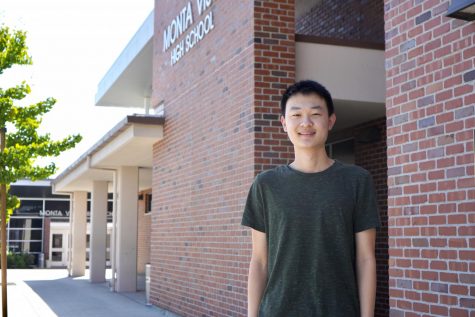Analyzing how the Course Information Fair affects students’ decisions
MVHS holds the annual Course Information Fair to provide information on classes
February 10, 2019
On Feb. 1, freshmen, sophomores and juniors scrambled around campus, entering different classrooms to listen to information sessions held by teachers. This 70-minute period is known as the annual Course Information Fair, when students can ask questions and learn about the courses that they will select for the upcoming school year.
According to vice principal Mike Martinez, teachers began planning for the event early on, coordinating between individuals in their departments and organizing presentations for their classes. As the administration oversaw the event’s preparation, they constantly asked themselves how to effectively provide information within the event’s time constraint of 70 minutes.
“The question always is, how do we maximize that time and get students the information most effectively?” Martinez said. “With that overarching question, we ask ourselves every year, ‘Is this the best format?’ ‘Is there something we can do better?’ This year, we tried to engage in some talks about, instead of just having students go around, should we run sessions?”
With each new year, the administration introduces changes to make the event more effective. This year, many classes were grouped together into a single session. The junior and senior literature teachers, for example, formed their own respective “teams,” and hosted sessions that offered information about all the literature classes for those grade levels.
While the structure of sessions is planned and created by individual teachers, to increase collaboration and cohesion between different classes, Martinez and administration encourages the departments to work together and make the information accessible.
“What we ask is for there to be transparency, that there be understanding amongst all the departments, that everybody knows what everybody’s doing,” Martinez said. “[For example,] the English department knows what the art department’s doing […], so everyone has access to everybody’s information and students have access to all this information.
Hosted after presentations from counselors in early January, the Course Information Fair aims to provide students with information to help them choose the most appropriate courses. Not all of it, however, is related to time spent on homework and content.
My hope is that we’re getting an opportunity for students to get out there and get questions answered that would allow them to decide whether this is the right course for them.
— Vice Principal Mike Martinez
“We hope that there are a lot of questions about how this course aligns with the student’s passions and interests,” Martinez said. “My hope is that we’re getting an opportunity for students to get out there and get questions answered that would allow them to decide whether this is the right course for them.”
Martinez stresses the importance of students asking questions and encourages students to take more time to make the most informed decisions.
Get out there, talk to people and make sure your schedule is right for you.
— Vice Principal Mike Martinez
“It’s funny to us that people are turning in their forms now, [yet] you have another three weeks in time to go out and get information,” Martinez said. “My advice is, wait until March 1, and use that time to really think about your schedules. Get out there, talk to people and make sure your schedule is right for you.”
Senior Yingkai Lee echoes that belief, encouraging all students to attend the fair, especially those who are unclear on their interests.
“I think the Course Information Fair has gradually diminishing degrees of importance,” Lee said. “As a freshman, it’s more important, since you have no idea how the school works, [so] you need to go around and ask teachers. As you progress and get older, you might have a better, precise idea of what you want to do in the future, so you already know what classes to take, since you want to take classes that align with these interests.”
The Course Information Fair fulfills its informational purpose, but Sophomore Benjamin Tang believes there is room for improvements in information retention; more classes should offer information handouts and post their presentations online.
“I noticed on SchoolLoop that the junior literature teachers sent out an email containing the PowerPoint from their presentation and I think other [classes] should do something similar,” Tang said.
Lee also believes the time restraints of the event are too small.
“Students may feel rushed when scrambling to visit all the classes they’re interested in,” Lee said. “Also, some classes are starting to have scheduled sessions, and it can be tough trying to attend all these scheduled sessions while also making time to visit other classes.”
In response to these concerns, Martinez hopes to establish complete access to the information teachers provide, including handouts and presentations, especially for students who were not able to attend certain sessions.
“As I’m on the outside, looking in [during] that 70 minutes, I’m watching everyone running around — it seems like a mad rush,” Martinez said. “I hope that we would have some processes in place that make it easier, and more transparent, more accessible [for students]. I’m looking for ways to make these things easier, accessible, and more functional for students; I think that’s always going to be the lens that I try to work from.”
















